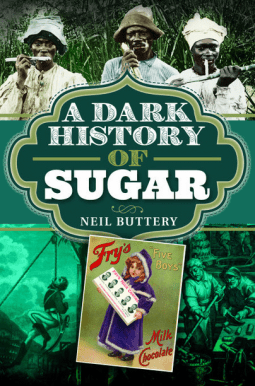I loved this book from cover to cover! “A Dark History of Sugar” by Neil Buttery has two distinct sections, the creation of sugar and the consumption thereafter. Neither is gentle but the creation is especially brutal. I am British by genes and I was familiar with our history of involvement in sugar production and that of the United States, but what preceded that was new and to read one well-written and unbiased account of its history is fascinating, and heart breaking. The ramifications of how humans were treated affects us still today.
The consumption side of things is disconcerting in a different way. We have been told lies, had our understanding managed by corporations, in the efforts to raise profits. A food substance has been assigned a value, a status, to be “sweet” is a good thing. The way the brain science speaks into the way we now consume forms of sweetness in new, far too easy ways is mind-shifting! I found this section more surprising than the first but not less disturbing!
Concise, intellectual and page-turning, it is hard to find a historical book that has all three but this one does! I give it five out of five and highly recommended!
I received a complimentary copy of the book from Pen & Sword History through NetGalley. Opinions expressed in this review are completely my own.

Back Cover:
A Dark History of Sugar delves into our evolutionary history to explain why sugar is so loved, yet is the root cause of so many bad things.
Europe’s colonial past and Britain’s Empire were founded and fuelled on sugar, as was the United States, the greatest superpower on the planet – and they all relied upon slave labour to catalyse it.
A Dark History of Sugar focusses upon the role of the slave trade in sugar production and looks beyond it to how the exploitation of the workers didn’t end with emancipation. It reveals the sickly truth behind the detrimental impact of sugar’s meteoric popularity on the environment and our health. Advertising companies peddle their sugar-laden wares to children with fun cartoon characters, but the reality is not so sweet.
A Dark History of Sugar delves into our long relationship with this sweetest and most ancient of commodities. The book examines the impact of the sugar trade on the economies of Britain and the rest of the world, as well as its influence on health and cultural and social trends over the centuries.
Renowned food historian Neil Buttery takes a look at some of the lesser-known elements of the history of sugar, delving into the murky and mysterious aspects of its phenomenal rise from the first cultivation of the sugar cane plant in Papua New Guinean in 8,000 BCE to becoming an integral part of the cultural fabric of life in Britain and the rest of the West – at whatever cost. The dark history of sugar is one of exploitation: of slaves and workers, of the environment and of the consumer. Wars have been fought over it and it is responsible for what is potentially to be the planet’s greatest health crisis.
And yet we cannot get enough of it, for sugar and sweetness has cast its spell over us all; it is comfort and we reminisce fondly about the sweets, cakes, puddings and fizzy drinks of our childhoods with dewy-eyed nostalgia. To be sweet means to be good, to be innocent; in this book Neil Buttery argues that sugar is nothing of the sort. Indeed, it is guilty of some of the worst crimes against humanity and the planet.

